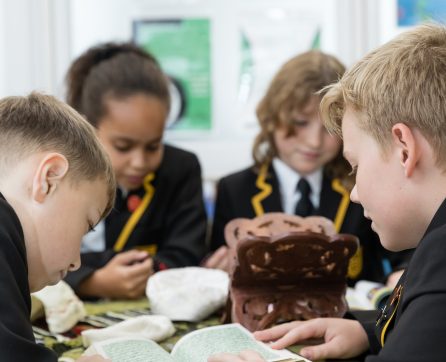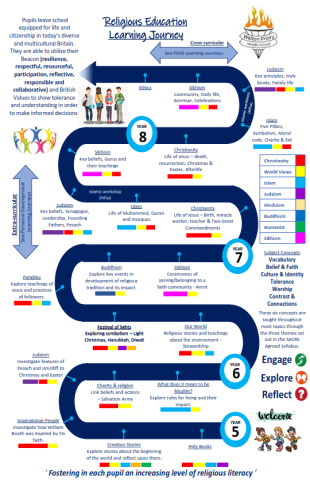
Religious Education is to help prepare and equip all pupils for life and citizenship in today’s diverse and multicultural Britain, through fostering in each pupil an increasing level of religious literacy.

KS2 RE provides opportunities for children to make connections between religion and religious texts, drawing out similarities and differences between religions. Pupils are taught about connections between religious texts, and people’s own beliefs and actions. In addition to this, pupils are given chance to read and interpret religious stories and texts, as well as consider and reflect upon their own and other’s opinions.
Our KS3 course engages students with RE, building their skills, knowledge and understanding in religion-based topics. This ensures wide-ranging and expanding knowledge of religion sequenced to build knowledge over time and creating a ‘readiness for future learning’. This equips our students with a solid grasp of four major world religions, as well as the core philosophical and ethical issues.
Please click here to view the RE Handbook.
To view our RE Learning Journey please click here.
Formative and summative assessment in RE
Formative and summative assessments play crucial roles in Religious Education (RE), serving distinct purposes in evaluating students’ understanding and growth in matters of faith, ethics, and cultural awareness. Formative assessment, characterized by ongoing feedback, enables teachers to gauge students’ comprehension, identify areas for improvement, and tailor lessons to meet individual needs. In the context of RE, formative assessment involves class discussions, reflections, and written work during lessons, fostering a dynamic and responsive learning environment.
On the other hand, summative assessment in RE serves as a comprehensive evaluation of students’ overall achievement, conducted at the end of a learning period. This assessment method provides a snapshot of students’ proficiency in religious knowledge, ethical reasoning, and their ability to apply these principles in real-life situations.
Together, formative and summative assessments in RE ensure a holistic view of students’ grasp of religious concepts and their ability to critically engage with diverse perspectives.
